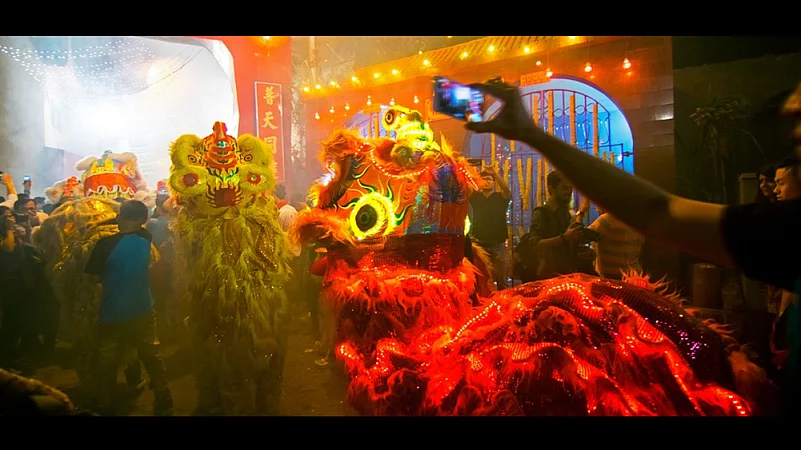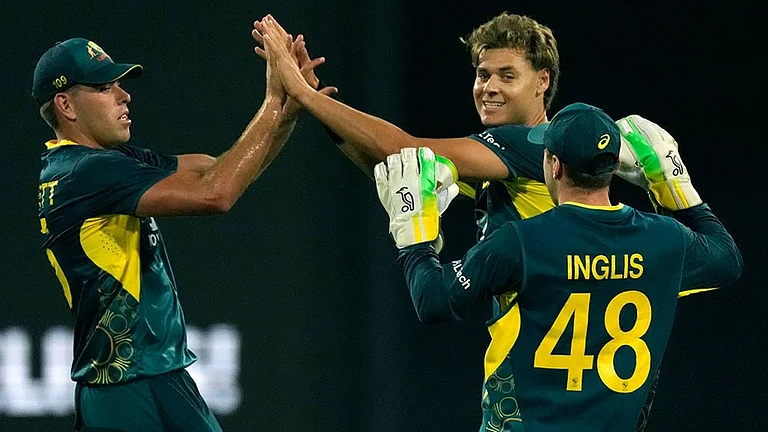The story of Chinese settlement in Kolkata goes back to the late 18th century when one Tong Achew set up a sugar manufacturing unit to the south of the city. Although the sugar factory closed down, the workers moved to the city proper. Scholars researching on international migration have written tomes about why Chinese immigrants settled in Calcutta (as the city was then known as). Through enterprise and hard work, the Chinese people soon integrated themselves into the city’s cosmopolitan framework. Initially, they settled down in the central part of the city (old Chinatown) and then some of the families shifted to the eastern fringe (Tangra, new China town).
Over the years, the Chinese people have assimilated themselves into the Indian mosaic while retaining their cultural identity. One of the best examples of the assimilation is the Chinese Kali Temple in Tangra. Over 50 years old, the temple offers noodles as ‘prasad’. Similarly, the Chinese New Year celebration has also become a popular fixture in the city’s festive calendar. The pandemic situation has affected public celebrations for the past two years but the Chinese community along with their neighbours are leaving no stones unturned to welcome the Year of the Tiger, starting from February 1 this year.
While all the traditional customs are followed by the Chinese people at home, they have opened up the community celebrations for everyone to join in. This has helped preserve the celebration which would have otherwise faded away with many families having moved to foreign shores over the past few decades.
During the New Year celebration (which lasts for 15 days), you may take a walk down Tiretta Bazar (landmark- Poddar Court), which is part of the old ChinaTown. Although somewhat crowded, you may explore the lanes and by-lanes of the area to find old Chinese temples, clubs and restaurants (some may remain closed during CNY), shoe and carpentry shops, sauce and spice factories, etc., managed by the community. However, walking past the open butcher shops and the piles of garbage does need effort.
But you may still catch the lion and dragon dancers and their accompanying party of drummers walking past, visiting temples and homes, or holding an impromptu performance at street corners. According to senior members of the community, non-Chinese people too now take part in the dances if there is a shortage of participants from within the community.
One of the stars on the city’s culinary map is Kolkata Chinese (think of chilli chicken, kamla puri). You may visit the food festival organised in the premises of the Pei May Chinese School in Tangra. It will be held on February 4 and 5 this year, from 2pm to 10pm. Usually, cultural performances are also held alongside the food festival.
Food Havens
Kolkata’s many dining dens have also logged into Chinese New Year celebrations this year. Many hotels and restaurants will be hosting musical programmes, lion dance and food festivals to usher in the Year of the Tiger.
- Hyatt Regency Kolkata is hosting Chinese New Year Fiesta with Music, Lion Dance and other celebrations until February 5 at their Poobar between 6pm and 10pm. Call: 62921 96230.
- JW Marriott Kolkata will be hosting Lion Dance at their lobby on February 1 (7pm) and a special lunch and dinner menu spread (until February 9) at their signature Oriental restaurant, Vintage Asia. Call: 33-6633 0000..
- Kava at Fairfield by Marriott Kolkata has a special CNY dinner spread on February 1 with a 15 per cent discount on the bill. Call: 76050 86817.
- Nori, part of The Westin Kolkata Rajarhat, is holding its Chinese New Year food festival until February 9, from 7pm to 11pm. Call: 90733 23290.
- Polo Floatel, the floating restaurant on the Hooghly River, lying to the west of the city, is offering a special CNY menu till February 6. The restaurant remains open between noon and 10pm. Call: 86979 71678.
- Chowman, one of the popular Chinese restaurant chains in the city, is hosting a special spread for patrons to welcome the Lunar New Year. The festive spread will be available until February 7. What’s more, the restaurant is offering a special discount to those born in the earlier Year of the Tiger (those born in 1950, 1962, 1974, 1986, 1998, 2010) subject to ID proof. Call: 18008902150 (toll free).
- Fatty Bao, which operates through Monkey Bar, has curated a special Chinese New Year menu which will be available from noon to 10pm on February 1. Call: 84203 09813.
- Flavours of India is hosting a special Chinese spread between February 3 and 12, available between 11am and 10.30pm. Call: 33-229019772.
Where It All Began
But did you know that unlike the rest of the world, where Chinese New Year celebration ends on the 15th day, it continues for a few more days in Kolkata? On the second Sunday after the Lunar New Year, the Chinese community of Kolkata pay a visit to the tomb of Tong Achew located on the southern fringe of Kolkata, at Achipur (near Budge Budge). The peculiar horseshoe-shaped grave lies on the bank of the Hooghly River.
Usually, people first pay a visit to the Chinese temple nearby (whose origin is lost in the annals of history) and then visit the tomb. The temple is dedicated to the Earth God and Earth Goddess (Khuda and Khudi) and enshrines their statues. The Chinese people not only conduct various rituals but also make lavish offerings of food and drinks. Note: People outside of the Chinese community are not barred from entering the temple or visiting the tomb so long as they do not disrupt those at prayer, or the rituals, or touch the food offerings.


























